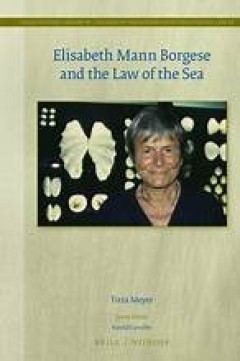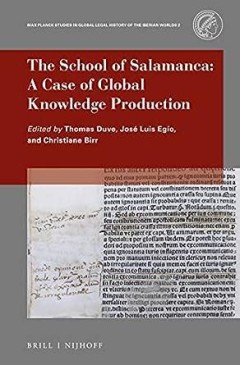Filter by

The Resilience of the Hungarian Legal System since 2010 = A Failed Resilience?
- Edition
- -
- ISBN/ISSN
- 9783031704512
- Collation
- VIII, 240 hlm ill; lamp
- Series Title
- -
- Call Number
- -
- Edition
- -
- ISBN/ISSN
- 9783031704512
- Collation
- VIII, 240 hlm ill; lamp
- Series Title
- -
- Call Number
- -

The Nexus Between Legal Pluralism and Inclusive Finance = Insights from Ethio…
This open access book provides detailed information on informal credit markets in Africa and how various legal systems affect these markets. Laws that impose strict formalism exclude many people from the financial system. The lessons learned from the informal credit markets in Ethiopia and South Africa indicate that pluralism offers better opportunities for people to access affordable and susta…
- Edition
- -
- ISBN/ISSN
- 9783031716539
- Collation
- VII, 160 hlm; ill., lamp.,
- Series Title
- -
- Call Number
- -

Theologians and Contract Law = The Moral Transformation of the Ius Commune (c…
The Roman legal tradition is the ancestor of modern contract law but there is no agreement as to how and when a general law of contract emerged. Wim Decock’s thesis is that an important step in this evolution was taken by theologians in the sixteenth and seventeenth centuries. They transformed the Roman legal tradition (ius commune) by insisting on the moral foundations of contract law. Theol…
- Edition
- -
- ISBN/ISSN
- 9789004232853
- Collation
- 748 hlm,: ill, lamp; 21 cm
- Series Title
- Studies in the History of Private Law, Volume: 9/4 Legal History Library, Volume: 9/4
- Call Number
- -

Elisabeth Mann Borgese and the Law of the Sea
In the late twentieth century, as the United Nations struggled to come up with a new legal system for the oceans, one woman saw the opportunity to promote radical new ideas of justice and internationalism. Ocean governance expert Elisabeth Mann Borgese (1918–2002) spent decades working with the United Nations Law of the Sea Convention. Throughout this sprawling series of global conferences, s…
- Edition
- -
- ISBN/ISSN
- 978-90-04-51144-6
- Collation
- oer.unej.ac.id
- Series Title
- Legal History Library
- Call Number
- -

The School of Salamanca: A Case of Global Knowledge Production
Over the past few decades, a growing number of studies have highlighted the importance of the ‘School of Salamanca’ for the emergence of colonial normative regimes and the formation of a language of normativity on a global scale. According to this influential account, American and Asian actors usually appear as passive recipients of normative knowledge produced in Europe. This book proposes…
- Edition
- -
- ISBN/ISSN
- 9789004449749
- Collation
- 444hlm; ill., lamp.,
- Series Title
- Max Planck Studies in Global Legal History of the Iberian Worlds, Volume: 2
- Call Number
- -

Administrating Kinship: Marriage Impediments and Dispensation Policies in the…
From the late eighteenth century, more and more men and women wished to marry their cousins or in-laws. This aim was primarily linked to changes in marriage concepts, which were increasingly based on familiarity. Wealthy as well as economically precarious households counted on related marriage partners. Such unions, however, faced centuries-old marriage impediments. Bridal couples had to apply …
- Edition
- Volume: 63
- ISBN/ISSN
- 9789004539877
- Collation
- -
- Series Title
- -
- Call Number
- -

The Ethical Spirit of EU Law
This open access book seeks to identify the ethical spirit of European Union (EU) law, a context in which we can observe a trend towards increasing references to the terms ‘ethics’ and ‘morality’. This aspect is all the more important because EU law is now affecting more and more areas of national law, including such sensitive ones as the patentability of human life. Especially when une…
- Edition
- 1
- ISBN/ISSN
- 9783030105822
- Collation
- XIX, 157 hlm,: ill, lamp;
- Series Title
- -
- Call Number
- -

The Resilience of the Hungarian Legal System since 2010 : A Failed Resilience?
This open access book explains the factors that cause the poor functioning or failure of certain legal institutions or the success of others in the current Hungarian legal system after the 2010 transition from liberal to illiberal/populist democracy. The authors argue in most regulatory areas that reform is needed in lawmaking or in the application and practice of law, because there are systemi…
- Edition
- 1
- ISBN/ISSN
- 9783031704512
- Collation
- VIII, 240 hlm,: ill, lamp;
- Series Title
- -
- Call Number
- -

Conservation of Contemporary Art : Bridging the Gap Between Theory and Practice
This open access book investigates whether and how theoretical findings and insights in contemporary art conservation can be translated into the daily work practices of conservators or, vice versa, whether and how the problems and dilemmas encountered in conservation practice can inform broader research questions and projects. For several decades now, the conservation of contemporary art has be…
- Edition
- 1
- ISBN/ISSN
- 9783031423574
- Collation
- VIII, 401 hlm,: ill, lamp;
- Series Title
- 9
- Call Number
- -

One Rights: Human and Animal Rights in the Anthropocene
This is an open access book.Animals are the traditional blind spot in human rights theory. This book brings together the seemingly disparate discourses of human and animal rights, and looks at emerging animal rights as new human rights. It approaches the question whether animals can and should have human rights through a comprehensive review of contemporary human rights philosophy, discussing b…
- Edition
- 1
- ISBN/ISSN
- -
- Collation
- -
- Series Title
- SpringerBriefs in Law
- Call Number
- X, 104
 Computer Science, Information & General Works
Computer Science, Information & General Works  Philosophy & Psychology
Philosophy & Psychology  Religion
Religion  Social Sciences
Social Sciences  Language
Language  Pure Science
Pure Science  Applied Sciences
Applied Sciences  Art & Recreation
Art & Recreation  Literature
Literature  History & Geography
History & Geography